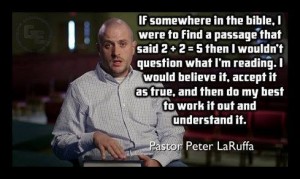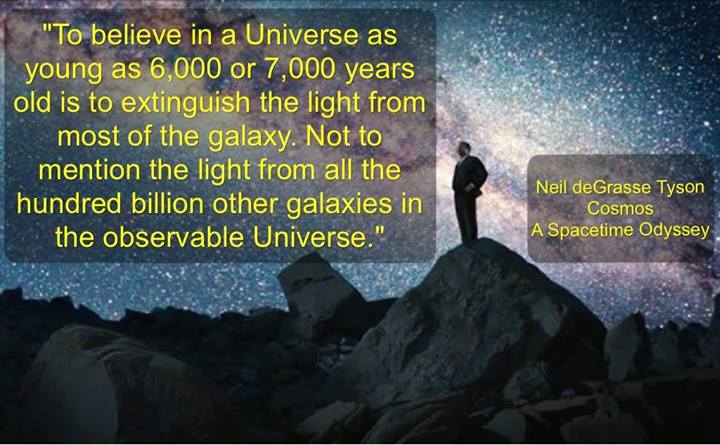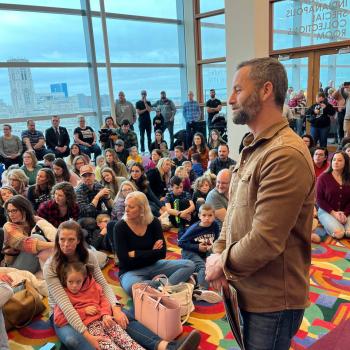I’ve been working my way through George Orwell’s 1984 again with my students. Not long ago, when a pastor said that if the Bible said that 2+2=5 he would accept it, it was pointed out that this was precisely something that comes up in the effort to recondition Winston Smith in 1984. But in fact, young-earth creationism of a sort itself comes up. Here is the relevant passage, which I think is worth quoting at length:
‘But the world itself is only a speck of dust. And man is tiny helpless! How long has
he been in existence? For millions of years the earth was uninhabited.’
‘Nonsense. The earth is as old as we are, no older. How could it be older? Nothing
exists except through human consciousness.’
‘But the rocks are full of the bones of extinct animals — mammoths and mastodons
and enormous reptiles which lived here long before man was ever heard of.’
‘Have you ever seen those bones, Winston? Of course not. Nineteenth-century
biologists invented them. Before man there was nothing. After man, if he could
come to an end, there would be nothing. Outside man there is nothing.’
‘But the whole universe is outside us. Look at the stars ! Some of them are a million
light-years away. They are out of our reach for ever.’
‘What are the stars?’ said O’Brien indifferently. ‘They are bits of fire a few
kilometres away. We could reach them if we wanted to. Or we could blot them out.
The earth is the centre of the universe. The sun and the stars go round it.’
Winston made another convulsive movement. This time he did not say anything.
O’Brien continued as though answering a spoken objection:
‘For certain purposes, of course, that is not true. When we navigate the ocean, or
when we predict an eclipse, we often find it convenient to assume that the earth goes
round the sun and that the stars are millions upon millions of kilometres away. But
what of it? Do you suppose it is beyond us to produce a dual system of astronomy?
The stars can be near or distant, according as we need them. Do you suppose our
mathematicians are unequal to that? Have you forgotten doublethink?’
Winston shrank back upon the bed. Whatever he said, the swift answer crushed him
like a bludgeon. And yet he knew, he knew, that he was in the right. The belief that
nothing exists outside your own mind — surely there must be some way of
demonstrating that it was false? Had it not been exposed long ago as a fallacy?
There was even a name for it, which he had forgotten. A faint smile twitched the
corners of O’Brien’s mouth as he looked down at him.
‘I told you, Winston,’ he said, ‘that metaphysics is not your strong point. The word
you are trying to think of is solipsism. But you are mistaken. This is not solipsism.
Collective solipsism, if you like. But that is a different thing: in fact, the opposite
thing. All this is a digression,’ he added in a different tone. ‘The real power, the
power we have to fight for night and day, is not power over things, but over men.’
Young-earth creationism is quite literally Orwellian. I wonder whether Orwell could have been aware of the claims that were found among Seventh-Day Adventists in his time.
 I think that those of us who are concerned about science education, who are convinced that there is a real world that needs to shape our beliefs, and who recognize the danger to humankind when people can be persuaded that 2+2=5, or the stars mere fires a few miles away, or fossils a Victorian-era deception, need to read more Orwell.
I think that those of us who are concerned about science education, who are convinced that there is a real world that needs to shape our beliefs, and who recognize the danger to humankind when people can be persuaded that 2+2=5, or the stars mere fires a few miles away, or fossils a Victorian-era deception, need to read more Orwell.
There is no modern-day young-earth creationist who has not learned the practice of doublethink. In order to maintain the belief that they are Biblical literalists, they have to find a way to accept that the arguments they use against flat-earthers are legitimate, but the arguments used against them are not.
Some within the Inner Party of young-earth creationists are surely aware of what they are doing and will likely be intransigent. But ordinary “party members” may be susceptible to reality intruding into their worldview.
When they fully grasp how they have been deceived and manipulated, they probably will not merely reject young-earth creationism, but will hate it with the vehemence that Winston and Julia hated Ingsoc – however much, because of the rigid authoritarian structures of fundamentalist churches, they may continue to tie their red sashes around their waists and pretend otherwise.
What led Winston and Julia to act upon that hidden hatred? Becoming persuaded that rebellion against the oppressive system truly is possible. Perhaps those of us who are seeking to combat the pernicious influence of young-earth creationism should spend less time trying to argue our way through their doublethink, and more time illustrating that it is possible for one to be a Christian and yet throw off the constraining shackles of the authoritarian system that threatens them with exclusion from their community here on Earth and exclusion from heaven in the future if they dare to challenge their rulers.
Winston Smith was confident that, even without hoping for divine intervention, the human spirit would refuse to participate indefinitely in the collective solipsism of Ingsoc. If we think he was right, then dare we to have the courage to hope that most young-earth creationists do not really want to be deceiving themselves and deceiving others?
If not, then perhaps Orwell was wrong, and what people will willingly deceive themselves into believing makes the heavy-handed methods of Big Brother unnecessary. If so, then young-earth creationism shows that the world, and humanity, are far scarier than what Orwell could bring himself to imagine.
Of related interest, Fred Clark has two posts, and Josh Rosenau one, on the issue of distant starlight and the lies of young-earth creationism. And don’t miss the Salon article about young-earth creationism, a flat Earth, and Biblical literalism, which I also linked to earlier in the post.













